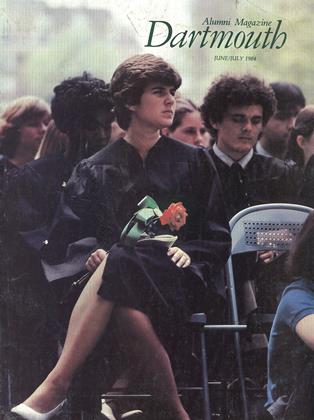FREE BUT REGULATED: CONFLICTING TRADITIONS IN MEDIA LAW
edited by Daniel L. Brenner '73 and William L. Rivers The Iowa State University Press, 1982. 283 pp., $24.95 cloth.
The major issues of the times, whether Central America or the machinations of the Gnomes of Zurich, affect most of us only indirectly, but mass communication confronts us constantly. Moreover, we are affected by legal determinations, because what we see on television, listen to on the radio, and read in print is largely a function of the interconnected realm of law and politics that is mass communications policy.
The pervasive importance of the mass media makes it crucial that the educated public have some idea of the issues now being debated with respect to regulation of mass communication, and an excellent place to start would be this collection of essays covering the most important issues. Although the book may at first appear somewhat technical, it is in fact designed as an introduction to these issues. It serves this purpose quite, well, and the non-specialist should feel no hesitancy, in. starting here for a survey of the questions now being debated. Through a series of essays, interspersed with the editors' own insightful-commentary, the reader is taken on a tour of the FCC's fairness doctrine, obscenity law, regulation of offensive language, the tension between a free press and a defendant's right to be tried free from prejudicial publicity, access to governmental information by the press, the right to privacy, programming for children, and regulation of product advertising, as well as a number of other issues. This tour also introduces the reader to several perspectives; some of the essays are by academic lawyers, others by. practicing attorneys, judges, and journalists, and even the FCC is represented. One of the essays is by an FCC Commissioner, and Brenner himself is currently legal assistant to the FCC chairman.
The breadth of topics and perspectives offered may obscure two problems with the book's coverage. One is a. slant towards a non-regulation perspective. Nowhere do we find a defense, for example, of obscenity regulation, or the fairness doctrine, despite the fact that, a defense of current law could hardly be called a fringe view. I have no objection to taking a particular point of view, especially when it is one with which I am in some sympathy, but the reader should know that these essays have been selected and the commentary written from a point of view likely to be most appealing to journalists, and less So to those with a wider outlook. My other concern is the editors' acknowledged tendency to see all of mass communications policy through a First Amendment lens. Not all questions of importance in this society are constitutional questions, and not all important decisions are made by the Supreme Court. More of a focus away from constitutional questions would give the reader a better idea of just how much of communications policy is a function of legislative and regulatory philosophy largely unrelated to the First Amendment.
But no book can or should be completely neutral on issues so important, and thus these cavils should be taken only lightly. This book remains an extremely provocative and informative introduction to some of the most vital issues of the day, and is strongly recommended for an audience with no prior exposure to the complexities of these issues.
Frederick Schauer '67, TU '68
Frederick Schauer, Professor of Law atthe University of Michigan, is the author of, among other works, Free Speech: A Philosophical Enquiry and The Law of Obscenity.
 View Full Issue
View Full Issue
More From This Issue
-
 Feature
FeatureProfessor John Stearns '16: Rara Avis Una
June | July 1984 By Eddie Chamberlain '36 -
 Feature
FeatureCreativity: The Open Dance at Dartmouth
June | July 1984 By Prof. Blanche Gelfant -
 Feature
FeatureWearers of the Green
June | July 1984 By Jim Kenyon -
 Feature
FeatureThe Best Part of My Academic Life Here
June | July 1984 -
 Feature
FeatureMaking it Happen
June | July 1984 By Peggy Sadler -
 Feature
FeatureThe Quiet Good Man
June | July 1984 By Young Dawkins '72
Peter Smith
-
 Letters to the Editor
Letters to the EditorLetters
APRIL • 1987 -
 Article
ArticleIn the Wide, Wide World
DECEMBER 1981 By Peter Smith -
 Article
ArticleEndings and Beginnings
JUNE 1982 By Peter Smith -
 Books
BooksWords of Wisdom
MAY 1984 By Peter Smith -
 Books
Books"One Man in His Time..."
JUNE/JULY 1984 By Peter Smith -
 Article
ArticleThe Hanover Scene
September 1986 By Peter Smith
Books
-
 Books
BooksShelf life
Nov/Dec 2011 -
 Books
BooksTime and the Rivers
March 1979 By Dan Nelson '75 -
 Books
BooksSoiled Pinstripes
October 1979 By DAVID M. SHRIBMAN '76 -
 Books
BooksTHE COLONEL'S LADY,
March 1949 By Herbert F. West '22. -
 Books
BooksSHAKESPEARE AND THE COMEDY OF FORGIVENESS.
JANUARY 1966 By JOHN FINCH -
 Books
BooksLooking Back
April 1979 By R. H. R.



